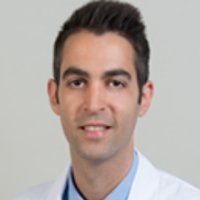
Jamal Nabhani, MD
Urology
MD – Boston University, Boston, MA
Residency – Urology, LAC + USC Medical Center, Los Angeles, CA
Biography: Dr. Jamal Nabhani, urologist, is interested in health care delivery and implementation as well as patient engagement and decision aids. He is also interested in patient-centered health care value.
Dr. Nabhani’s main research project was a policy project titled “The Effect of Medicaid Expansion on Surgical Care.” His mentors on this project were Mark Litwin, Chair of Urology at UCLA; Arlene Fink, Adjunct Professor Public Health and General Internal Medicine; and Jack Needleman, Professor of Public Health at UCLA. The specific aims were 1) to determine the effect of Medicaid expansion on access to surgical care for low-income patients by measuring differences in rates of surgery for low-income populations between expansion and non-expansion states; 2) to assess changes in surgical care for minority populations resulting from Medicaid expansion by measuring differences in rates of surgery for non-white patients between expansion and non-expansion states; and 3) to measure the effect of Medicaid expansion on uncompensated surgical care by comparing rates of surgical care to uninsured individuals between expansion and non-expansion states. Findings from this research informed a critical and under-investigated aspect of Medicaid expansion—surgical care. Moreover, it added to the emerging body of evidence evaluating Medicaid expansion under the ACA, uniquely characterizing the effect of state policy on access to specialized care in vulnerable populations. If access to care and rates of uncompensated care improve for these populations in states that expanded Medicaid, the study will provide early evidence that Medicaid expansion has worked to decrease healthcare access disparities outside of primary care. Opposite findings would be a call to policy makers and specialty providers, alike, to identify and address the mechanisms underlying the policy’s shortcomings in providing comprehensive care. Either finding is important to informing future US healthcare policy. The following reports were submitted to peer-reviewed journals for publication: 1) Differences in Utilization of Surgical Care in Low-income Populations between Medicaid Expansion and Non-expansion States and 2) The Impact of Medicaid Expansion on Uncompensated Inpatient Surgery.
Dr. Nabhani also worked on other projects with his mentor team including: 1) “Immediate and temporal changes in urologic surgery in Kentucky after the Affordable Care Act” was presented at the May 2018 AUA National Meeting and a manuscript describing this work is in preparation. 2) “Differences in quality of life and healthcare utilization between low-income English- and Spanish-speaking men with prostate cancer gaining insurance under the Affordable Care Act” and 3) “Barriers to enrollment and care in low-income men with prostate cancer gaining insurance coverage under the Affordable Care Act,” were both presented at the APHA National Meeting, November 4-8, 2017. 4) “The transition from a statewide prostate cancer treatment program to comprehensive insurance under the Affordable Care Act in low-income men” and 5) “Surgeon behavior and surgical modality drive variation in the surgical management of BPH” were both presented at the May 2017 AUA National Meeting. Additionally, Dr. Nabhani was the first author of an article called, “Health Changes in Low-income Men Transitioning from a State-funded Prostate Cancer Program to Comprehensive Insurance,” which was published in the Journal of Urology in July 2018.
Dr. Nabhani obtained a Master’s of Science in Health Policy Management and engaged in activities to better understand health policy, the mechanisms of creating, evaluating, and innovating health policy and to improve his leadership skills. He took the lead among urologists at LA County DHS to spearhead a population management tool for kidney stone patients as well as low risk prostate cancer. He also mentored a 1st year medical student during his fellowship. In addition, Dr. Nabhani served as an attending in the Urology clinics at both the Veterans Affairs West Los Angeles and Sepulveda and at Olive View Medical Center.
In addition to research projects and clinical work in the Program, Dr. Nabhani served as a board member for Young and Healthy Pasadena which is a not-for-profit organization helping provide and coordinate free acute and chronic care for uninsured children in Pasadena. He served as a clinical instructor at the West Los Angeles Veteran’s Affairs demonstrating fundamental skills in endoscopic and open urologic surgery.
Dr. Nabhani now serves as an assistant professor of Clinical Urology, Keck School of Medicine of USC; Service Chief, Department of Urology LAC+USC Medical Center. He is responsible for clinical and administrative duties related to the day-to-day operations of the Department of Urology at LAC+USC Medical Center, and leading education for a team of urology residents and nurses, as well as co-leading efforts in a new multi-disciplinary research group (urology, preventive medicine, medical oncology) focused on health disparities in urologic cancers. Dr. Nabhani is interested in implementing social interventions to improve the quality of subspecialty care in the safety net and is working with the department in engaging patients of the LA County Department Health of Services (DHS) in a community advisory board to direct changes in the structure and context of care. They are the first non-primary care service in DHS to create a community advisory board and will be using knowledge gained to guide changes to the clinical sites and times, processes of care (e.g. patient financial screening for surgery), and social services (e.g. transportation, nutritional support) available to patients.